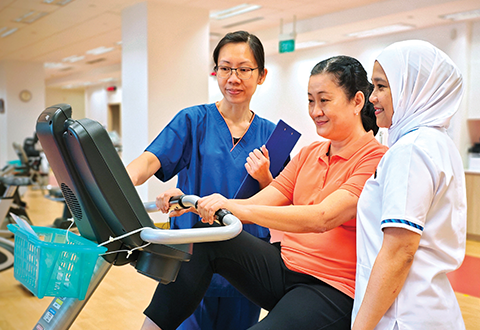
Physiotherapy and rehabilitation programmes tailored to post-cardiac events are widely recognised for their efficacy in promoting cardiac health and individual well-being.
At NHCS, the Department of Cardiac Physiotherapy and Rehabilitation Services uses a holistic approach, utilising evidence-based benefits to help cardiac patients get back on their feet.
A comprehensive, multi-faceted approach
The NHCS Cardiac Physiotherapy and Rehabilitation Services offers seamless care from initial assessment to rehabilitation, throughout the patient journey from pre-operation to post-operation in the inpatient and outpatient settings.
The comprehensive cardiac rehabilitation programme, conducted under the supervision of cardiac physiotherapists and nurses, is designed to improve cardiovascular health, enhance functional capacity, and promote overall quality of life for individuals who have:
- Experienced cardiac-related events or procedures, such as angioplasty, coronary artery bypass surgery, valve surgeries and implantations, mechanical heart device or cardiac device implantations and heart transplantation
- Cardiac conditions such as heart failure and are on medical management
- Undergone thoracic related procedures such as lung surgery or lung transplantation
Early ambulation helps patients recover faster and better
Research has shown that early mobility is vital in preventing postoperative complications, improving functional capacity and reducing length of hospital stay in patients after cardiac surgery1. Since 2018, NHCS Cardiac Physiotherapy and Rehabilitation Services has introduced the Enhanced Recovery After Surgery (ERAS) programme, which helps to initiate early mobilisation for suitable cardiac and thoracic patients on the same day post-surgery. This is achieved through an evidence-based multidisciplinary team approach involving medical, nursing and physiotherapists.
Nadiah Binte Mohamed Rahim, Senior Physiotherapist, shared, “The team utilises a set of protocols and guidelines to standardise care for patients suitable for ERAS. Patients can safely start gradual mobilisation on the same day after their surgery.”
Another service provided by the department is Prehabilitation (Prehab), where patients are recruited early into an exercise programme before their surgery. With Singapore’s ageing population, the conventional way of starting rehabilitation only after an operation may face more complexities due to co-morbidities, frailty, and psychosocial factors. A research study demonstrated that preoperative exercise intervention significantly reduced post-operative pulmonary complications and decreased the length of hospital stay in older patients2.
The services offered include:
Assessment of functional capacity
Exercise testing and prescription
Supervised individualised exercise training in inpatient and outpatient settings
Cardiovascular risk factor modification
Educational talks including diet, and nutrition and pharmacological counselling
Assessment and treatment of musculoskeletal conditions
Throwing fun and safety into the mix
Recognising that some patients find it challenging to adhere to standard exercise sessions, the team introduced exergaming to the repertoire of interventions at the outpatient service.
“With exergaming, we inject a fun element into an otherwise ordinary regime. Carefully selected video games were introduced to encourage large muscle activity and rigorous exercise, facilitating balance and strength training with an enjoyable twist compared to traditional methods,” shared Michael Khoo, Physiotherapist.
Benefits of cardiac rehabilitation
After a cardiac event such as a major surgery like coronary artery bypass grafting or smaller procedures like percutaneous coronary interventions (example, stenting), patients enrolled in a cardiac rehabilitation programme would experience a multitude of benefits. It helps to significantly improve their exercise capacity and cardiorespiratory function, and enhance their quality of life including physical functioning, emotional well-being, and social integration.
Research has also evidenced how cardiac rehabilitation is associated with lower cardiovascular mortality rates, fewer recurrent cardiac events, and reduced hospitalisations among patients with coronary artery disease3.
| MISCONCEPTIONS OF CARDIAC REHABILITATION |
|---|
| “The exercises seem overly strenuous or unnecessary after a cardiac event.” Patients will be educated on when and how they can do their exercises and the suitable level of activity after a cardiac event. The intensity of exercises will also progress gradually. |
| “I am physically well so I do not need cardiac rehabilitation.” Despite being physically well, patients might still have cardiac risk factors (e.g. hypertension, diabetes) which may be improved through cardiac rehabilitation. |
| "‘One Size Fits All’ so it does not benefit me." The NHCS cardiac rehabilitation programme considers the patient's medical history, current condition, and personal goals to create a customised plan for optimal recovery. |
| The NHCS cardiac rehabilitation programme is for NHCS patients and by referrals only. |
Typical programme for NHCS Cardiac Physiotherapy and Rehabilitation Services Patients:
Exercise sessions at NHCS
- Once or twice weekly for eight weeks
- One-to-one or group exercise class based on medical condition and functional ability
- Guided and supervised rehabilitation, including aerobic, flexibility and resistance exercises
Exercise sessions at home
- Exercise safely and conveniently at home with instructions and guidance from cardiac physiotherapists for suitable patients.
Education
- Attend virtual educational talks or one-to-one counselling and education sessions with nurses
REFERENCES
1. Ramos Dos Santos, P. M., Aquaroni Ricci, N., Aparecida Bordignon Suster, É., de Moraes Paisani, D., & Dias Chiavegato, L. (2017). Effects of early mobilisation in patients after cardiac surgery: a systematic review. Physiotherapy, 103(1), 1–12. https://doi.org/10.1016/j.physio.2016.08.003
2. Snowdon D, Haines TP and Skinner EH. Preoperative intervention reduces postoperative pulmonary complica- tions but not length of stay in cardiac surgical patients: a systematic review. J Physiother 2014; 60(2): 66–77.
3. Dibben, G. O., Faulkner, J., Oldridge, N., Rees, K., Thompson, D. R., Zwisler, A. D., & Taylor, R. S. (2023). Exercise-based cardiac rehabilitation for coronary heart disease: a meta-analysis. European heart journal, 44(6), 452–469. https://doi.org/10.1093/eurheartj/ehac747
This article is from Murmurs Issue 47. Click here to read other articles or issues.













 Get it on Google Play
Get it on Google Play